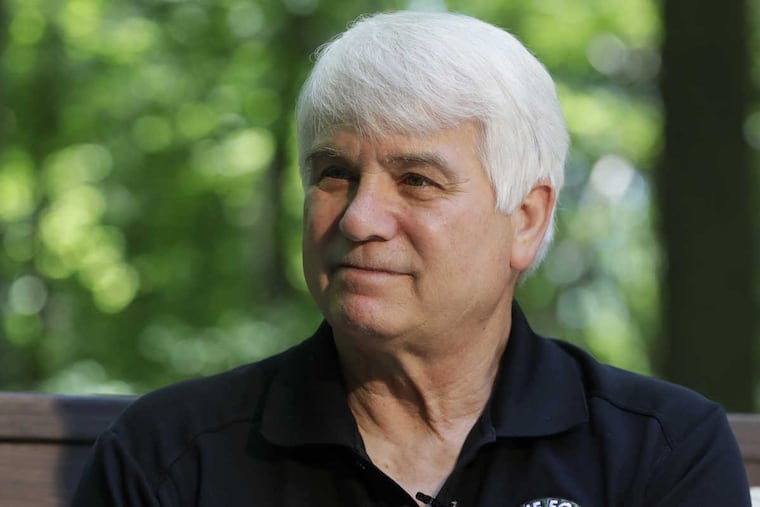Vietnam War medic, now 71, awarded Medal of Honor
At a White House ceremony Monday, President Donald Trump recognized James McCloughan with the Medal of Honor. It marks the first time Trump has presented the nation's highest decoration for combat valor.

WASHINGTON – It is difficult to assess which of James McCloughan's near-death encounters in Vietnam was the most harrowing. There were so many. From the moment his infantry unit hit the field March 9, 1969, they encountered a ferocious enemy determined to repulse the Americans at all costs.
"I got initiated the very first day," McCloughan, 71, recalled in a recent interview with Army biographers. "We hit our first ambush. We had a man die. Had a few people to patch up. And I shot a man. That's a lot to digest in your first day.
"But I didn't know I was going to face anything like Tam Ky," he added, alluding to the location of a vicious 48-hour battle, three months after he arrived in Vietnam, during which the 23-year-old combat medic risked his life at least nine times to save wounded or stranded comrades – 10 men in all – and prevented a much larger North Vietnamese force from overrunning them entirely.
At a White House ceremony Monday, President Donald Trump recognized McCloughan with the Medal of Honor. It marks the first time Trump has presented the nation's highest decoration for combat valor.
The operation began May 13, 1969. That morning, elements of McCloughan's unit – Charlie Company, 3rd Battalion, 21st Infantry, of the 196th Light Infantry Brigade – were flown into the foliage near Tam Ky, a city along Vietnam's central coast. They came under immediate attack, and two U.S. helicopters were shot down.
"It was a hot LZ," McCloughan said in his interview with the Army. He was referring to the helicopter landing zone where he and the others were unloaded. "The minute that we got there, we were fired upon."
McCloughan joined a squad of soldiers sent to locate one of the helicopter crews, according to the Army's summary of action for his Medal of Honor. When they arrived at the crash site, he spotted a soldier too injured to move. As his squad mates exchanged fire with North Vietnamese, McCloughan sprinted to reach the man, hoisted him onto his shoulder and carried him to safety.
Later, McCloughan's platoon sustained heavy casualties when they were ambushed by a larger North Vietnamese force while scouting a nearby hill. With U.S. airstrikes falling nearby, he left his weapon behind and ran toward two unarmed soldiers who were pinned down.
While assessing them for injuries, McCloughan was sprayed with shrapnel from the blast of a rocket-propelled grenade. He carried the men to safety despite his wounds.
McCloughan would make similar trips at least four more times, ignoring his commander's orders to stay back and instead charging into a kill zone to save the wounded.
The next day was devastatingly bad. As McCloughan and his platoon moved through a trench line, they saw North Vietnamese soldiers ahead. A battle erupted, and Pfc. Dan Shea, the medic from their sister platoon, was killed, cut down trying to carry a wounded soldier to safety. For his courageousness, he was recognized posthumously with the Medal of Honor.
"I got him, got his body, and now I'm the only medic," McCloughan recounted. "So I downed my pack, near a tree, and got all of my pressure bandages out of there and put them in all of the pockets that I had. . . . And now I start going to get men."
Amid the frenzy, McCloughan sustained additional wounds from small-arms fire and shrapnel, but he refused to leave his unit without a medic. As the battle reached its peak, Charlie Company was nearly enveloped by hundreds of enemy fighters. McCloughan ran through the crossfire again and again to pull out the wounded.
He encountered a soldier who had been shot in the stomach, patched him up as best he could and "carried him like a baby" into a nearby trench where he would be safe. A machine-gunner had been shot through the shoulder. McCloughan treated him and moved him to the trench. There were four or five others in really bad shape, he recalled. McCloughan brought them into the trench too, hopeful they could be saved.
That night, when the soldiers had run low on ammunition, McCloughan volunteered to crawl into the open carrying a light so a helicopter carrying their gear could locate them. But the resupply never came. He continued to treat casualties into the next morning, helping fend off attacks and keeping two seriously wounded soldiers alive. At last, that afternoon, he helped gather the dead and wounded so the unit could be evacuated.
McCloughan's combat tour ended in March 1970. He left the Army and eventually returned home to South Haven, Michigan, where he became a high school teacher. He also coached football, baseball and wrestling. He retired in 2008.
Reflecting on his experience 48 years later, McCloughan explained to the Army's biographers that he was unsettled upon learning that he would be sent to Vietnam almost immediately upon completing basic training. He had hoped to remain stateside, at least to start his time in the Army, but the job he wanted went to another soldier who had enlisted. McCloughan was a draftee.
Eventually, he said: "I got into the right frame of mind that I will serve my country. I didn't volunteer to do it, but they've asked me, so that's what I'll do."